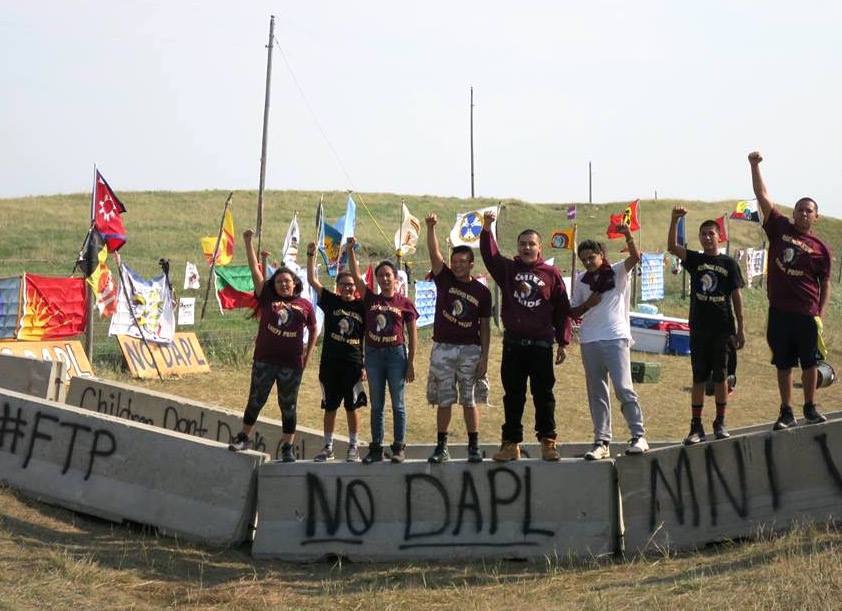Special Update on the Dakota Access Pipeline: People Power beats Corporate Power
Weekly Update
December 4, 2016
For human rights activists, indigenous rights activists, and environmental activists alike, Sunday was the first bright day in a long time.
On Sunday, the Army Corps of Engineers officially denied Energy Transfer Partners the right to build the Dakota Access Pipeline through the land of the Standing Rock Sioux tribe. The Army Corps says they will also be doing an environmental impact study on the pipeline, according to npr.com.
It’s over, and the protectors won.
But it’s also not over.
This struggle has represented many different fights rolled into one: the fight for indigenous rights, the fight against corporate power, and the fight against fossil fuels and climate change. Certainly the most important of these issues was that the rights of the people of Standing Rock, as set out by the United Nations Declaration on the Rights of Indigenous Peoples. Originally, the pipeline was to be built near the drinking supply of a mainly white community. The path was then changed to go under the water source of the Native tribe and 18 million others, and was complete except for the section that would travel under the Missouri river. But it is thanks to the tireless efforts of water protectors from all over the country who came out to Standing Rock to assist the tribe in their nonviolent struggle that the pipeline will again be rerouted, hopefully to an area where no drinking water will be affected.
Of course, in order to achieve that goal, the pipeline would need to cease existing. As JP Sears illustrated in his (hilariously sarcastic) video about the DAPL: “Between 1999 and 2010, [Enbridge Energy Partners, an oil company with a large stake in the project] averaged only one oil spill every five days, a measly 804 in total, spilling a barely noticeable 5 million gallons of oil into the environment.” The enemies of pipelines argued that any pipeline built will inevitably spill. Oil companies frequently argue that their leak detectors will help detect spills before they get too big, often forgetting to mention that leak detectors only work 22% of the time.
So while this was a tremendous victory for indigenous people all over the nation, there are still many battles to be fought. And while the spotlight was on North Dakota, the Obama administration signed off on two new pipelines for which plans are currently underway, though construction has not yet begun.
One is the Trans-Pecos, a 42-inch diameter pipeline which will be travel directly beneath the Rio Grande river, inevitably affecting the drinking supply of thousands, according to the aforementioned statistics. The other is the Comanche Trail pipeline, another 42-inch pipeline whose route will take it over the border into Mexico.
According to the proposals submitted to and approved by the Federal Energy Regulatory Commission, Trans-Pecos and Comanche Trail are owned by a subsidiary of Energy Transfer Partners, the largest stakeholder in the Dakota Access Pipeline.
Sunday marked an enormous, historic win for indigenous (and human) rights activists, showing that the people really do have power. However, many environmental activists such as myself are left feeling mixed emotions. When the news broke, I was immediately elated. I thought of how all the people who were attacked by law enforcement for protecting their own land, and how their sacrifice was not in vain. I thought of how indigenous people all over the country, even the continent, must feel knowing that the government was actually electing to protect their rights and honour treaties.
I also thought of the fact that the pipeline will most likely still be built, and how new pipelines are being approved, planned for, and built every day.
I even thought of the incoming Trump administration, and what his policies will mean for the future of pipeline construction, the fossil fuel industry, and indigenous rights. The President-Elect has already proclaimed his support of the Dakota Access Pipeline, and there is a very real possibility that this victory will be short-lived, as the Trump administration might see fit to approve the project after all.
For now, however, celebration is in order. The incredible efforts of the people on the frontlines of the peaceful demonstrations who were willing to potentially put their lives on the line in order to protect their water, land, and rights for future generations must not go unrecognized. And this tremendous accomplishment must be adequately emphasized, as it is not only a triumph for native rights, but for non violence as a method of causing positive change.
One question remains: Was this an isolated incident, or will the power of nonviolent direct action continue to prevail over irresponsible corporations who would put profits over people? Time will tell, but this will certainly not be the last time people come together to stand up for what they believe in, and, eventually, succeed.
































Paul Nemeth • Dec 5, 2016 at 9:20 am
Well done Sarah.